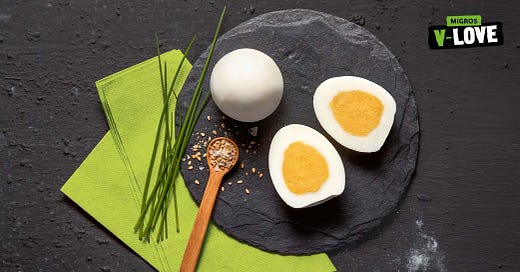Veggie Digest #13
Meat made of upcycled cashew waste, plant-based hard-boiled egg, environmental labeling to reduce greenwashing, and much more!
Welcome to the latest installment of the Veggie Digest, the newsletter that keeps you on top of the latest in sustainable food innovations.
Headlines and Trends
A curated roundup of interesting food tech news from the past week.
📰 Upcycled Cashew Meat that Cooks Like Chicken, Pork, or Tuna (Vegconomist)
The Hawaiian startup Cajú Love created the first-ever plant-based meat made from cashew fruit fibers. The cashew meat is made out of upcycled fruit discarded by the cashew nut and cashew juice industries every year. These cashews are a highly sustainable resource, and the highly nutritious fruit cooks just like chicken, pork, tuna, or ground meat.
📰 The World’s Addiction to Palm Oils Is Only Getting Worse (Bloomberg)
Palm oil contributes to global warming as forests are removed to allow space for oil palm plantations. Since palm oil is cheap, abundant, and probably the most versatile crop produced by large-scale farming, the global production of palm oil has tripled since the start of the century. On average, each person consumes 8 kg of palm oil every year, and most of the time we are not aware we are using it because palm can appear in a list of ingredients under more than 200 names. However, with a growing global food crisis, the destruction of tropical forests, and global warming, it is more important than ever to control the damage caused by the world’s most pervasive form of tropical agriculture.
📰 The World’s Most Advanced Lab-Grown Meat Facility Opens in California (VegNews)
Food technology startup UPSIDE Foods opened its first large-scale production facility in Oakland, CA. The facility can currently produce 50,000 pounds of cell-based meat, with a future capacity of more than 400,000 pounds of the innovative meat annually. Currently, at COP26, world leaders are committing to reduce methane emissions and deforestation. Hopefully, these promises will lead to commitments to fund alternative protein which would be a huge win for the cultivated meat sector and the planet.
📰 By the Numbers: Plant-Based Food Sales and Prices (Grocery Dive)
In 2020, plant-based food retail sales grew 27%. This is because more products are available and manufacturing capacity has expanded for plant-based products. Also, a study last year by Kroger and the Plant-Based Foods Association found that plant-based meat shelved next to its traditional counterparts sold 23% better. The largest sales growths were refrigerated plant-based milk and plant-based meat.
📰 Plant-Based Hard-Boiled Egg (The Spoon)
Migros, the Swiss retail and grocery giant, announced they are launching a new plant-based hard-boiled egg. The new egg is called The Boiled and gets its protein from soy. According to Swiss daily newspaper Aargauer Zeitung, The Boiled looks just like an egg and tastes pretty close to one too. To watch a video of how this innovative egg is made, click here.
Food Lingo: “Greenwashing”
There’s a lot of jargon in the food technology and sustainability space. Each week I highlight an important concept to improve your food lingo literacy.
Greenwashing is a type of marketing that deceives consumers into believing that a product is environmentally friendly when it is actually not.
📰 How Environmental Labelling on Food Could Be the Antidote to Greenwashing (The Grocer)
The Foundation Earth organization has launched an environmental score, a color-coded system that scores how sustainable a food product is, that will be applied to all food products across Europe. It is a simple and standardized label/grade that will indicate the product’s environmental impact. Hopefully, if consumers have this credible, independent information, it will enable them to purchase more sustainable products and make more eco-friendly choices.
Sustainability Beyond Food
A handful of non-food-specific pieces to keep you abreast of other environmental items of interest.
📰 In Iceland, C02 Sucked from the Air Is Turned to Rock (Tech Xplore)
A newly opened plant in Iceland named “Orca” is sucking carbon dioxide from the air and turning it into rock. Orca is the world's largest plant using direct air capture technology (DAC). CO2 is pulled from ambient air, filtered, and heated to separate the pure gas. After that, the carbon dioxide is then piped underground, injected under high pressure into the basalt rock, and fills the rock's cavities so the solidification process can begin.
🎥 Video: The Beginning of the End of the Great Pacific Garbage Patch (YouTube)
The Ocean Cleanup is a non-profit foundation founded by Dutch inventor Boyan Slat in 2013. An international team of engineers, researchers, scientists, and environmentalists has been developing a large-scale system for cleaning up the Great Pacific Garbage Patch (GPGP). Known as “System 002”, the technology consists of a towed, permeable screen that catches plastic debris. A recent test of the prototype was successful and the organization plans to continue improving System 002 with the hopes of deploying the system at scale in order to significantly reduce the GPGP.
———
Thank you for reading the Veggie Digest newsletter. If you’re enjoying it, be sure to share it with your friends and colleagues.
If this newsletter was forwarded to you, visit this link to subscribe.
You can reach me by replying directly to this email or by adding a comment on Substack.


